Who speaks for Iraqi Sunni Arabs?
- Published
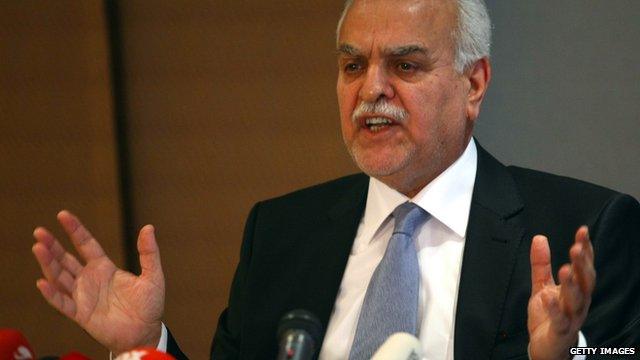
Exiled former vice president Tariq al-Hashemi is one of Iraq's most prominent Sunnis
Advances by the Islamic State in Iraq and the Levant (Isis) and the growing threat of an all-out sectarian war in Iraq has prompted questions over who speaks for Iraq's minority Sunni Arab community.
Prime Minister Nouri Maliki met three prominent Sunni Arab leaders - along with Shia Arab and Kurdish politicians - on 17 June to try defuse tensions. The Speaker of the Council of Representatives, Osama Nujaifi, Mosul Governor Atheel Nujaifi and Deputy Prime Minister Saleh al-Mutlak added their names to a call for unity in the face of ISIS's offensive.
One of the most prominent Sunni Arab figures is former vice-president Tariq al-Hashemi, who fled into exile in 2011 and was sentenced to death after being convicted in absentia of running sectarian death squads. He has been outspoken in his criticism of Mr Maliki during the recent crisis. Earlier this year, he said Sunni Arabs had resorted to violence because peaceful demonstrations had been ignored.
A number of other figures are often mentioned in the Iraqi media as influential in the Sunni Arab community.
Politicians
Parliamentary Speaker Salim al-Jabouri
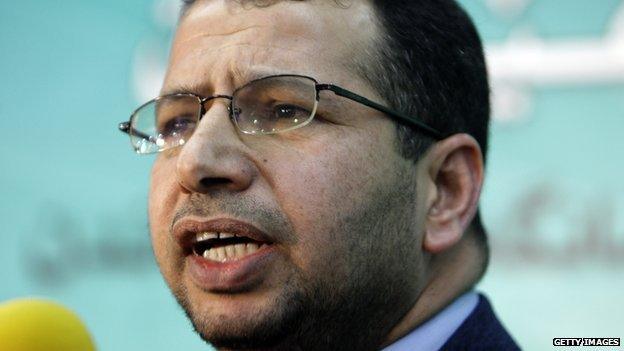
Mr al-Jabouri is seen by some as a moderate Sunni
Sunni Arab politicians picked Salim al-Jabouri as their candidate for parliamentary speaker and he was confirmed in the role in the assembly's delayed first session in July 2014.
He was seen as less contentious a candidate for the role than his predecessor Usamah al-Nujayfi.
Described in some Iraqi media as a "moderate Sunni", the former law lecturer is a member of the Iraqi Islamic Party, Iraq's Muslim Brotherhood group, and an MP for Diyala province.
He was part of a committee which drew up a new constitution which was adopted in 2005, and has been chairman of parliament's human rights committee.
Two of his brothers were assassinated in Diyala province in 2007, and in April 2014 he survived an assassination attempt when his convoy was targeted at a checkpoint there.
He is said to oppose a third term for Prime Minister Nouri Al-Maliki, though by some accounts he is prepared to cooperate with whoever the the mainly Shia Iraqi National Alliance put forward as its candidate.
He was born in 1971 in Diyala province, and was elected as a member of parliament in 2010.
The Iraqi Islamic Party and al-Jabouri himself have often been criticised by Sunnis for letting them down, either by agreeing to join a Shia- led government or by allegedly not doing enough to lobby for Sunni demands.
Former Speaker Osama Nujaifi
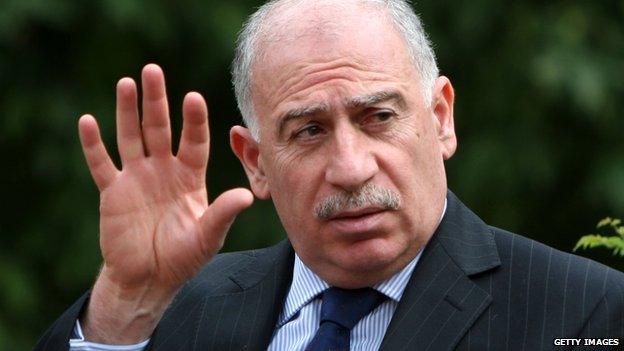
Osama Nujaifi has reportedly tried to find outside support to end the crisis
The scion of a prominent Mosul family, Mr Nujaifi is considered one of the top Sunni Arab political figures in Iraq for his long background in politics, experience that was recognised when he became parliamentary speaker in 2010.
After the fall of Mosul, Iraq's second city, Mr Nujaifi issued a statement holding the Iraqi army command responsible for the fall of the city.
His name is often mentioned in the Iraqi media as a key player in finding a solution to the current crisis, and he was reported to have sought the support of US diplomats to deal with the crisis.
Mosul governor Atheel Nujaifi
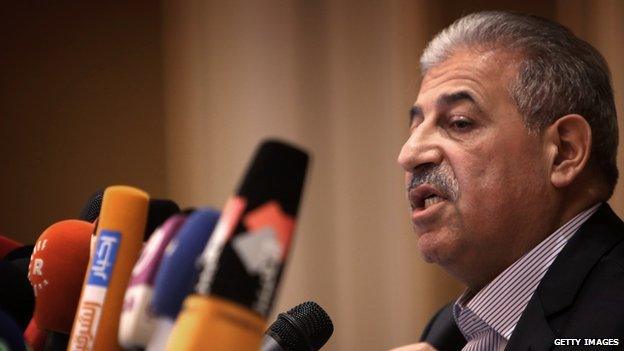
Governor Atheel Nujaifi has been blamed for the fall of Mosul
Atheel Nujaifi is the brother of Osama and governor of Mosul.
Several Iraqi media organisations have criticised him, blaming him for the fall of Mosul and calling for his dismissal as governor.
Writing on the news website sotaliraq.com, columnist Ahmad al-Shamri said Mr Nujaifi had "handed over Mosul to the terrorists".
Deputy Prime Minister Saleh al-Mutlak
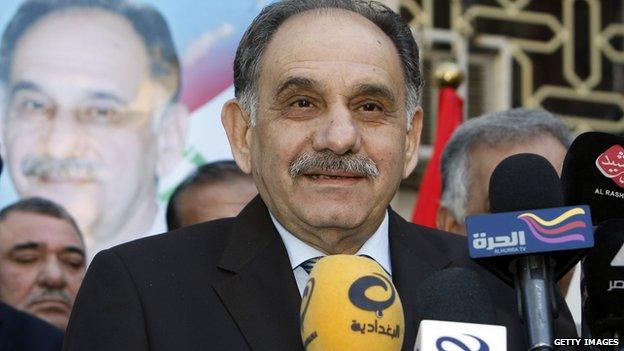
Since 21 December 2010, Mr Mutlak has been one of the three deputy prime ministers of Iraq.
He has blamed the army for the fall of Mosul. Some Iraqi websites have highlighted his meeting with a US diplomat.
Clerics and others
A number of high-ranking Sunni clerics and MPs are mentioned in Iraqi reporting of the current crisis:
Iraq's Sunni Mufti Rafi Rifai
Rafi Rifai, a prominent scholar and jurist, has often criticised Prime Minister Maliki and his government.
In an interview with the Saudi-funded Al-Arabiya TV channel on 17 June, for example, Mr Rifai called Mr Maliki a "small employee working for Iran".
Senior Sunni cleric Abdul Malik Sadi
Some newspapers highlight a statement attributed to Mr Sadi in which he criticised Iraq's Shia cleric Grand Ayatollah Ali Sistani for urging his supporters to fight Isis. Pro-Sunni forum almoslim.net and Egyptian pro-Islamist Al-Misryiun news website published the statement, quoting Mr Sadi as saying that Mr Sistani's call would lead to a "sectarian war" in Iraq.
Muslim scholar Harith al-Dari
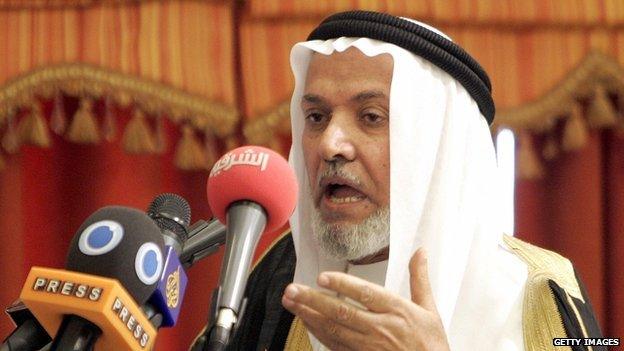
Scholar Harith al-Dari has been a key Sunni resistance figure
Harith al-Dari is leader of Iraq's Association of Muslim Scholars (AMS).
AMS owns the pro-Sunni Rafidayn TV channel, which was shut down on 18 June. Rafidayn was the AMS's anti-government and "pro-resistance" channel that many Sunnis turned to as their favoured news source, its popularity indicating Mr Dari's influence.
Even before Rafidayn TV was set up, Mr Dari was always a key figure in the "Sunni resistance".
Ex-MP Ahmed al-Alwan
Former MP for al-Anbar province Ahmed al-Alwan was arrested on terrorism-related charges in 2013 following a gun fight with security forces that led to the killing of his brother.
That incident was one of the catalysts for the clashes in Anbar province in December 2013.
Tribal leader Ali Hatem al-Suleiman Dulaimi
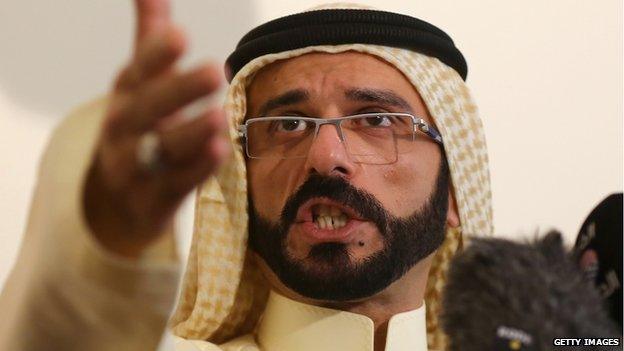
Ali Hatem al-Suleiman Dulaimi leads a rebel group
Mr Dulaimi is head of the Dulaim tribe and leader of the rebel Anbar Tribes' Revolutionary Council.
The group started its military activities after the government forces stormed an anti-government protest site in Anbar, prompting the mass resignation of Sunni parliamentarians in December 2013.
In an interview with the sotaliraq.com news website on 17 June, he said that "rebels of the tribes", and not Isis, were in control of Mosul. He also called for the sacking of Mr Maliki, adding that the "Sunnis would not participate in any government headed by Maliki".
BBC Monitoring, external reports and analyses news from TV, radio, web and print media around the world. For more reports from BBC Monitoring, click here. You can follow BBC Monitoring on Twitter , externaland Facebook, external.